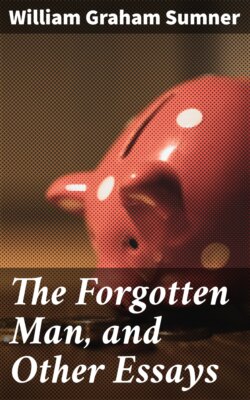Читать книгу The Forgotten Man, and Other Essays - William Graham Sumner - Страница 47
На сайте Литреса книга снята с продажи.
(I) That our Industries would Perish without Protection.
Оглавление123. Those who say this think only of manufacturing establishments as “industries.” They also talk of “our” industries. They mean those we support by the taxes we pay; not those from which we get dividends. No industry will ever be given up except in order to take up a better one, and if, under free trade, any of our industries should perish, it would only be because the removal of restrictions enabled some other industry to offer so much better rewards that labor and capital would seek the latter. It is plain that, if a man does not know of any better way to earn his living than the one in which he is, he must remain in that, or move to some other place. If any one can suppose that the population of the United States could be forced, by free trade, to move away, he must suppose that this country cannot support its population, and that we made a mistake in coming here. This argument is especially full of force if the articles to be produced are coal, iron, wool, copper, timber, or any other primary products of the soil. For, if it is said that we cannot raise these products of the soil in competition with some other part of the earth’s surface, all it proves is that we have come to the wrong spot to seek them. If, however, the soil can support the population under an arrangement by which certain industries support themselves, and those which do not pay besides, then it is plain that the former are really supporting the whole population—part directly and part indirectly, through a circuitous and wasteful organization. Hence the same strong and independent industries could certainly still better support the whole population, if they supported it directly.
124. I have been asked whether we should have had any steel works in this country, if we had had no protection. I reply that I do not know; neither does anybody else, but it is certain that we should have had a great deal more steel, if we had had no protection.
125. “But,” it is said, “we should import everything.” Should we import everything and give nothing? If so, foreigners would make us presents and support us. Should we give equal value in exchange? If so, there would be just as much “industry” and a great deal less “work” in that way of getting things than in making them ourselves. The moment that ceased to be true we should make and not buy. Suppose that a district, A, has two million inhabitants, one million of whom produce a million bushels of wheat, and one million produce a million hundredweight of iron; and suppose that a bushel of wheat exchanges for a hundredweight of iron. Now, by improved transportation and emigration, suppose that a new wheat country, B, is opened, and that its people bring wheat to the first district, offering two bushels for a hundredweight of iron. Plainly they must offer more than one bushel for one hundredweight, or it is useless for them to come. Now the people of A, by putting all their labor and capital in iron production, produce two million hundredweight. They keep one million hundredweight, and exchange one million hundredweight of iron for two million bushels of wheat. The destruction of their wheat industry is a sign of a change in industry (unifying and not diversifying) by which they have gained a million bushels of wheat. Such is the gain of all trade. If the gain did not exist, trade would not be a feature of civilization.
